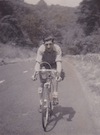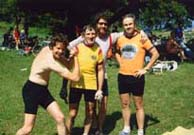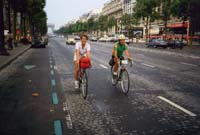|
|




(Click Images to enlarge or open)
Memoir: a country, a continent, the world by bicycle: 1943-1993 50 years 500,000 km (45 pages - PDF) |
Trans USA 48,000 km: Trans USA 48 countinuous states bicycle tour 1991-1993 (39 pages - PDF) - |
Above are John Hathaway's two self-assembled book documents. The first one is his memoir, intended to be a published picture book. It seems more or less complete but is missing the pictures. The second one has a focus on his 48 state tour (1991-1993), but also has a lot of other material pointing to earlier cycling accomplishments. The page order is a little suspect, but this is reproduced here in the order in which I received them, and it is probably correct. I think that maybe this was an old-school cut and paste project, still in progress. I remember John showing this booklet to us at randonneur cycling events in 1995 when I was a new rider. A third document exists which outlines his apparently very well planned out high-altitude world tour which began in 1986. This tour was abandoned when Hathaway was hit by a truck in Argentina. Sincere thanks to Hathaway's Vancouver friend Jack Sharkey for providing all three documents in 2015. And of course thanks to Harold Bridge who helped assemble material for this page in 1997. Below are two written offerings from Harold Bridge (also a British time-trialist who immigrated to Canada) which offer insight into Hathaway's cycling legacy. The longer first one was Harold's eulogy for his friend. Eric Fergusson |
|
John Hathaway: A Retrospective by Harold Bridge I first heard about John in 1944, during World War II. I first saw John in action in 1949 during a 100 mile time trial in which he passed me. I first corresponded with him in 1966 when Joan and I were planning to leave Montréal and head west and first met him July 19, 1966, when we had arrived in Vancouver. I feel a personal reminiscence may be of more value in a Club Newsletter than an official obituary. Cycling, the oldest and best of the magazines devoted to our sport, was always standard fare in our house and I used to eagerly wait for Dad to come home from work with the current week's issue in his saddle bag. In scanning the previous weekend's race results I would get used to seeing the name J. W. Hathaway at or near the top of time trial results in the Midlands, especially around his home in England's Bicycle City, Coventry. There was one event I had particular interest in. It was a mountain time trial in North Wales. It was too far away for me to enter but it was such a change from the normal "out and home" courses we used on fast main roads that I would have loved the opportunity to ride. In 1950 the event was won by a young unknown, Reg Devonport, with John second. If the handicapper had been right John was due to beat Reg by 2 minutes. It was shortly after this that both names disappeared from the results and it was 1957 before I found out what had happened to J. W.H. In Cycling an article appeared, written, I think, by John, in which he described his epic attack on the Trans-Canada record. He had reduced the figure from 30 days that had stood since 1947 to 24 days 13 hours. (Photo of Hathaway in 1956 at Brother Eric's wedding.) Joan and I landed at Montréal October 23, 1964, a Friday. On the Sunday we were on a club run round Ile Bizard with other expatriates, including Reg Devonport. So, I found out what happened to the other one from that 1950 event. We left Montréal May 3, 1966, in a '64 Chevelle Malibu station wagon which was to be our home for what turned out to be 10 weeks. We headed south to mosquito bites on top of severe sunburn after falling asleep on Daytona beach. New Orleans, Grand Canyon, the Sierra Nevadas, Mount Rushmore, Yellowstone, Banff, Jasper and finally Vancouver followed on July 17, 1966, a Sunday. In Calgary we had stayed in a campsite right in the middle of downtown, we were hoping for a similar facility in Vancouver. We were parked at Ceperley in Stanley Park. We asked a policeman about camping facilities. No luck, but we could stay where we were for 2 or 3 nights while we found work. On the Monday evening we phoned John and made arrangements to visit him and Margaret the following evening. Not being ready to lose our parking spot we left the wagon there and cycled over to Alamein Street, just off MacDonald. They made us most welcome, high tea, trifles, the lot. Out came the photo albums and old event result sheets. A lovely evening and as it was getting toward dusk and we had no lights I suggested to Joan we should get back. "Back where?", asked John. "Our camp". "Where are you camping?" "In Stanley Park." "You've got a tent in Stanley Park?", (Incredulity in his voice). "No, our station wagon". "What station wagon?". "The one we did this 12,000 miles in of course". The light came; "OH! you didn't do it on your bikes then?!" That conversation sums up John and his love or addiction to the bike. We had found out he had done a similar journey in reverse in 1955 when he decided to return to UK for a trial run at the old life. He did 8,000 miles in 88 days getting to Montréal. Before that he had cycle camped his way from Toronto, where he holed up for his first Canadian winter, to Vancouver through the summer of 1953. He had hoped to make the Canadian team for the last of the Empire Games (to become the Commonwealth Games). But, employment opportunities were thin and a drafting job at Ocean Falls kept him away from the action. It was after that he decided to take a run at the old life and in 1956 he finished his only 24 hour time trial, 414 miles (662 KM). He decided to return to Vancouver. But being who he was hit on the idea of attacking the Trans-Canada record and organized it from England. Being an unsupported ride he had a stack of postcards to be date stamped at various locations across the country. Soon after returning to Vancouver he met and married Margaret and from 1959 to 1967 us west in 1967 (with an unsuccessful attempt on John's record), I was able to reintroduce Reg and John, who hadn't seen or heard of each other since that day in 1950. It got John back on a bike and before long he had a Jack Taylor tandem for some touring with Margaret. But Margaret, a diabetic, gradually went blind and died in 1971 of kidney failure. From then on John returned to cycling despite breaking his hip outside the BC Sugar Refinery on a badly maintained level crossing. Whether it's recognized by anyone I don't know, but later in 1971 he set a Provincial record from Dawson Creek to Vancouver of 69 hours for the 1200 KM. The following year, in blazing August he took the Calgary-Vancouver record down to 51 hours 6 minutes despite fierce heat and strong head winds, especially through the Fraser Canyon. (12 years before the construction of the Coquihalla route). By 1974 he was looking for new fields to conquer and decided to take a run at the Guinness Book of Records. In November he set off south with a route planned that would give him 50,000 miles in 100 weeks. Through USA, Mexico & Central America to South America he got to Buenos Aires from where he sailed for Cape Town ready to head north up the "Dark Continent". India, Malaysia, & Australia preceded island hopping to Japan. He was held up for a few weeks waiting for a visa from the USSR to permit him to travel the Trans Siberian railway to Moscow. Nearly finished up in prison for riding his bike in town. More train travel saw him in Europe where was able to start riding again. A convoluted route through Europe and Britain saw him in 1976 ready to tackle that year's Audax version of Paris-Brest-Paris (PBP). Instead of riding independently the groups stay together behind the Captain who maintains a rigid 22.5 KPH. John found that tough. John was successful, with his world ride getting him a mention in the Guinness book. But, with his return to Vancouver in October 1976, his European trip sowed the seed for Gerry Pareja, Dan McGuire, Wayne Phillips, and John to plan on the PBP randonnée in 1979. Wayne got round in 65 hours, John in 77, Gerry in 79 and Dan in 83 hours. That set the pattern for the creation of BC randonneuring. In 1983 John improved his PBP time to inside 72 hours. By 1986 John was getting itchy feet again and he planned another Round the World epic. This time aiming to climb the World's highest roads en route. He left Vancouver on the last day of Expo and headed east to the Continental Divide and headed south from there. His 62nd birthday on January 13, 1987, found him clambering up the world's highest road out of Lima, Peru. Unfortunately, in Argentina he was hit by a truck, damaging some vertebrae and was in hospital for some weeks. They have a very good cost saving scheme there. The medical care is free but patients' families are expected to look after them. John always had fond memories of the Argentinian family that looked after him. The damaged back left him a good deal more wizened than he had been. But he still managed to cock a leg over a saddle and cover some considerable distances. In 1990 he sold up everything here and headed back to England. But things didn't work out for him there and before long he was on the road again. He started PBP '91 having qualified in UK events. But his free wheel packed up on him and he was stranded very early in the event. He arrived back in Vancouver in May 1992 after another journey that took in the entire mainland US States except Alaska. He became a mainstay of Vancouver Bike Club runs, as well as joining in on the Seniors' rides mid week. His old nemesis returned, a heart murmur which controlled his riding and the decline had set in. Early in April 1997 he was diagnosed with cancer. From then on he declined but was, as always, content with his lot. "I've always done what I wanted to do", he said to me once. He retained his sense of humor to the end. I walked in the ward once to take his brother and sister-in-law back to Jack and Rosemarie Sharkey's place. "Are we ready to go?", I asked. "I am", John said, with a smile. He didn't mind, I think he felt his life ended when he could no longer ride a bike. John William Hathaway Revision: June 13, 1997 John Hathaway's frame plate from PBP 1983 From an e mail in 2003, also by Harold Bridge: John was born in Coventry, England's bicycle city, in 1925, Jan 13. Started a racing career during WW2. It was interupted by military service in the Royal Marines. Returned to racing quite successfully in & around his Midlands home, winning time trials from 25 miles to 12 hours. He was banned from bunch racing on his hometown velodrome due to his dangerous riding. Emigrated to Toronto in 1953, "to get away from racing". Cycle camped across the country to Vancouver. In 1955 decided to return to UK to help decide where he wanted to live, Vancouver or Coventry. But he took a rather devious route to get there. On bike, south to LA, east to New Orleans & north to New York where he boarded a boat to Southampton. Had another succesful racing career in UK during 1956 during which he rode a 24 hour event. Decided Vancouver was to be his home & made arrangements to return. Set out from Quebec City to ride to Halifax. From there he planned to attack the Trans Canada record that had stood since 1947 at 27 days. John got to Vancouver in 24 days 13 hours. The record stood for 20 years until Richmond's Wayne Phillips got the record to under 20 days in 1977. Soon after arriving in Vancouver he married & quit cycling. In 1967 he made a reurn to cycling & the rest is recent enough history enough VBC members know it. Arold. (a.k.a. the Iron-Butt Award) Presented to the BC Randonneur with the most brevet (and flèches) distance ridden anywhere in the world in a season. The award was initiated by Harold Bridge in 1997. |